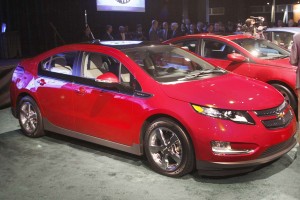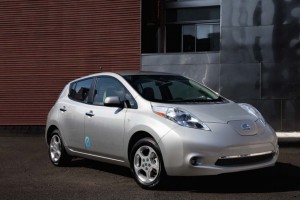
The Chevy Volt was named North American Car of the Year last January, beating out the Nissan Leaf - and setting in motion a distinct rivalry.
With only one quarter left, sales of the much-balleyhooed Chevrolet Volt plug-in hybrid are running well short of expectations and lagging the battery cars chief rival, the Nissan Leaf, by a margin that widens every month.
Has the Volt come unplugged or will Chevy be able to make up lost ground with a massive build-up of momentum in the final three months of the year – as company officials insist?
With less than 4,000 sold so far this year and a goal of moving 10,000 Volts for all of 2011, General Motors will need to nearly triple September sales if it’s to hit that target.
“It’s a little surprising” how low the numbers have been, according to Joe Phillippi, automotive analyst with AutoTrends Consulting, especially in line with the steady growth in demand for the Leaf – which is itself going to need a big bump to hit its own 20,000-unit goal for 2011.
Through the end of September, Nissan sold 7,199 of its pure battery-electric vehicle, or BEV, with sales last month of 1,031. Volt sales totaled just 723 in September, with year-to-date volume at 3,895.
Both makers have a lot riding on their new battery cars, which have been heavily promoted well beyond what the raw sales targets might otherwise justify. But both GM and Nissan aim to use their new green machines to help them curry favor with environmentally sensitive buyers – and to chip away at rival Toyota’s perceived position as the greenest of automotive brands.
Sales started slow at both makers, the manufacturers cautiously aiming to ensure that suppliers could meet quality targets while assembly workers could handle the complex new technologies used in Volt and Leaf. Nissan planned to begin ramping up production in early spring, though that was delayed slightly by the Japanese earthquake and tsunami of March 11. But sales doubled between April and May, jumping from 573 to 1,142, and have averaged more than a thousand a month since then.
Nonetheless, to hit the original target of 20,000 this year will mean selling more than 3,000 a month during the final quarter.
Even if they miss that target, Nissan officials are hoping to stay ahead of Chevrolet, underscoring the rivalry between the two companies.
For their part, GM officials have insisted that it’s not an apples-to-apples comparison. They note that Volt was initially launched in just a handful of markets and is only just rolling out nationwide. Production of the Volt began to ramp up later than that of the Nissan Leaf – only after an extensive changeover and protracted shutdown at the Volt plant in Detroit in July.
Output just hit targets in September, according to Alan Beatty, Chevy’s Vice President of Marketing, at 150 of the plug-ins a day. Many of those are still in transit to dealers and, he adds, “More than two thousand dealers need to be provided demos from the 2012 model year before they can start selling the Volt.”
That’s a matter of debate, an inventory search of Cars.com showing Chevy dealers have about 2,600 Volts in inventory, nearly two-thirds as many as they have sold so far this year.
What’s clear is that Chevy will have to turn up the voltage fast if its claims for Volt are to be taken seriously. The good news, the maker says, is that Volt buyers are an affluent lot, the average income of the early adopter coming in at $175,000. A full 80% are new to General Motors, according to the maker’s sales chief, Don Johnson, who notes, “The (Toyota) Prius is the most traded-in vehicle.”
Nissan, incidentally, also claims it is struggling to deliver enough vehicles to dealers. It has not met showroom demand for demonstration vehicles, according to U.S. sales chief Al Castignetti, “because we’re still in a pre-sold situation and are expanding. All of our production has gone to meet consumer demand.”


I think it’s all in the timing. Right now with the economy down as well as gas prices we’re not going to see big sales. If we hit another bump in the road that causes gas prices to shoot up to close to $4.00 a gal. then we’ll see an increase in sales.
I’d buy one tomorrow if the price was right. Even if Chevy was offering 0% financing for 60 months, the monthly payment is going to be nearly $550, and that is for a small car, no matter its sophistication. It only seats four. I’m a GM guy and I’m going to buy GM, but until they can get that price down to around $400 a month for 60 months, or maybe offer a 3-year lease for around $350 a month, the Volt doesn’t offer me any sort of incentive to buy. I must say that the Leaf surprises me in its sales pace, as it doesn’t offer the versatility that the Volt does, and a person could end up having to walk home if they are not paying attention. I’d love to see just where the Leaf buyers are; I’m guessing urban areas, and not Montana.
Remember r123t, the money you save in gas will make up part of your payment.
Of course you’re correct, Jlowe. As I said, I’d buy one tomorrow if I could afford it. As a GM retiree, I’m just praying for Chevy to sell the Volt in huge amounts. I’m not knocking the Volt at all, but its price, and the fact that it is a four-seater, is just a bit on the high side right now. If the Volt ends up coming down in price as the technology becomes more mainstream, like computers and HDTVs did, I’ll probably purchase a Volt as a second vehicle. I just can’t justify it as my main vehicle right now. A new Malibu will probably be my next purchase, costing thousands less, respectable gas mileage, and seating 5 in a pinch. I’ll stress again, though, I do like the Volt.
I’m a GM retiree too r123t so since I now drive less than 10,000 miles a year it wouldn’t be feasible for me to get one but if I was still working and driving the 36 miles one way to work every day I would have already bought one specially knowing that the plant I worked at would have given me a special parking place where I could plug it up and recharge it for the trip home.
I hear what you are saying, jhowe. Your situation was (and is) similar to mine. I also had to drive about 40 miles one-way, and the Volt would have been quite the car to have when i was still an active employee. I doubt the plant that I worked at has any recharging stations in the parking lot yet, but wouldn’t that be wonderful if GM did set aside parking places for Volts where employees could recharge their vehicles for the trip home? Nothing better to sell cars than to have the public seeing employees driving their own product, and especially for new technology like the Volt, having people see how they work in real-life situations.